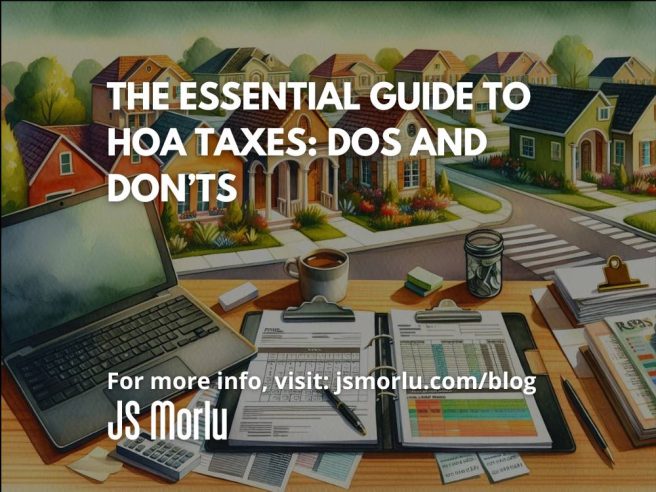By: John S. Morlu II, CPA
Tax season can be daunting for Homeowners Associations (HOAs), as their tax obligations are more complex than personal taxes. From filing deadlines to selecting the correct tax form, understanding the nuances of HOA tax compliance is critical to avoiding penalties and ensuring the financial health of your community. Here’s an expanded and detailed guide to what your HOA should do—and avoid—when managing taxes.
DO: File Your HOA Taxes
The IRS requires all HOAs to file a tax return annually, regardless of income or size. While many HOAs operate as non-profits under state law, they are not automatically exempt from federal tax filing requirements. Filing ensures compliance and prevents penalties.
Key Details:
- Filing is mandatory, even if your HOA has no taxable income.
- Filing does not necessarily mean your HOA will owe taxes, especially if most of its income qualifies as exempt-function income.
Industry Fact:
The IRS considers HOAs a business entity for federal tax purposes, even if they’re classified as non-profits under state law.
DON’T: Assume Your HOA Is Tax-Exempt
Tax-exempt status for HOAs is rare and requires meeting stringent IRS criteria. To qualify, an HOA must:
1. Not perform exterior maintenance for privately owned homes.
2. Make its owned land available for public use.
Key Insight:
Most HOAs do not qualify for tax-exempt status because their operations primarily benefit private homeowners, not the general public.
Pro Tip:
Consult an HOA-specialized CPA to understand your association’s tax obligations and clarify misconceptions about tax exemptions.
DO: Know Your HOA’s Tax Deadlines
The IRS imposes strict deadlines for filing tax returns. Your HOA’s deadline depends on its fiscal year:
- April 15: For associations operating on a calendar year basis.
- September 15: For associations with a fiscal year ending June 30.
How to Check Your Deadline:
Refer to the IRS website or consult your CPA for guidance. Missing deadlines can lead to costly penalties.
DON’T: Wait Until It’s Too Late
Delays in preparing and filing HOA taxes can result in penalties and interest. Filing early allows time to address complexities and ensures compliance.
Key Risks of Procrastination:
- Late filings incur daily penalties and interest charges.
- Errors due to rushed preparation increase the risk of IRS audits.
Extension Option:
If you’re unable to file by the deadline, use Form 7004 to request a six-month extension. Note that this does not extend the payment deadline for any taxes owed.
Fun Fact:
HOAs that begin preparing taxes in January are 35% less likely to encounter filing delays, according to a 2022 HOA-USA survey.
DO: Work with a CPA Experienced in HOA Taxes
HOA taxes are complex, involving unique income classifications and forms. A CPA with HOA expertise can:
- Distinguish between exempt and non-exempt income (e.g., dues vs. rental income).
- Help determine whether to file Form 1120 or Form 1120-H.
- Ensure compliance with state-specific filing requirements.
Industry Fact:
HOAs working with specialized CPAs report a 30% reduction in tax errors and a lower likelihood of IRS audits.
DON’T: Handle Taxes Alone
While the treasurer is responsible for the HOA’s finances, filing taxes without professional help can lead to costly mistakes. HOA taxes require knowledge of specific IRS rules that most board members may not have.
Pro Tip:
Outsource tax preparation to a CPA while the treasurer acts as the liaison, ensuring all required documents are submitted on time.
DO: Use the Correct Tax Form
Form 1120-H (U.S. Income Tax Return for Homeowners Associations)
This form is specifically designed for HOAs and simplifies tax filing. It allows HOAs to exclude exempt-function income—such as dues and assessments—from gross income.
- Advantages: Easy to prepare and generally results in lower tax liability.
- Requirements: At least 85% of the HOA’s income must come from exempt-function activities, and 90% of its expenses must support exempt purposes.
Form 1120 (U.S. Corporation Income Tax Return)
This form is more complex but may be advantageous for HOAs with significant non-exempt income (e.g., rental income or interest).
- Advantages: Provides more deductions, potentially lowering tax liability in specific scenarios.
- Disadvantages: Requires detailed reporting and carries a higher risk of audits.
Pro Tip:
Each year, compare the results of both forms and file the one that minimizes your tax burden.
DON’T: Overlook State Tax Filing Requirements
State tax obligations vary widely. Some states, such as California, require annual filings, even for non-profits, while others may have minimal or no filing requirements.
Example:
- California: HOAs must file Form 199 annually for non-profit status and may also be subject to state income tax.
- Texas: Generally, HOAs do not owe state income tax but must still meet state-specific reporting requirements.
Pro Tip:
Consult a CPA familiar with your state’s HOA tax laws to ensure compliance.
Additional Financial Planning Tips for HOAs
Beyond taxes, effective financial management involves:
1. Budget Preparation: Plan for operating expenses, reserve contributions, and unexpected costs.
2. Reserve Fund Maintenance: Ensure your reserve fund is adequately funded to cover major repairs and replacements.
3. Annual Audits: Regular financial audits help maintain transparency and homeowner trust.
4. Governing Document Reviews: Periodically update your HOA’s governing documents to align with current laws and best practices.
Industry Fact:
HOAs with clear financial goals are 25% more likely to stay within budget and avoid special assessments, according to the Community Associations Institute (CAI).
FAQs About HOA Taxes
Q: Do HOAs need to file tax returns every year?
Yes, all HOAs are required to file federal tax returns annually, even if they don’t owe taxes.
Q: Can HOA fees be deducted on personal taxes?
Generally, no. HOA fees are not tax-deductible unless they are related to rental properties or business expenses.
Q: Are HOAs automatically tax-exempt?
No. HOAs must meet strict IRS criteria to qualify for tax-exempt status, which is uncommon.
Q: What happens if an HOA misses the filing deadline?
Late filings incur penalties and interest, and repeated non-compliance could trigger an IRS audit.
Conclusion: Stay Compliant and Avoid Penalties
Tax season is a critical time for HOAs to demonstrate financial responsibility. By understanding federal and state requirements, working with experienced professionals, and preparing early, your HOA can minimize tax liabilities and avoid costly mistakes.
Take the stress out of HOA taxes—partner with a CPA specializing in association finances and ensure compliance for a financially sound community.
📖 Read next: Common Errors in HOA Tax Filings: How to Avoid Costly Mistakes
Author: John S. Morlu II, CPA
John S. Morlu II, CPA, is the CEO and Chief Strategist of JS Morlu, a globally acclaimed public accounting and management consulting powerhouse. With his visionary leadership, JS Morlu has redefined industries, pioneering cutting-edge technologies across B2B, B2C, P2P, and B2G landscapes.
The firm’s groundbreaking innovations include:
• ReckSoft (www.ReckSoft.com): AI-driven reconciliation software revolutionizing financial accuracy and efficiency.
• FinovatePro (www.FinovatePro.com): Advanced cloud accounting solutions empowering businesses to thrive in the digital age.
• Fixaars (www.fixaars.com): A global handyman platform reshaping service delivery and setting new benchmarks in convenience and reliability.
Under his strategic vision, JS Morlu continues to set the gold standard for technological excellence, efficiency, and transformative solutions.
JS Morlu LLC is a top-tier accounting firm based in Woodbridge, Virginia, with a team of highly experienced and qualified CPAs and business advisors. We are dedicated to providing comprehensive accounting, tax, and business advisory services to clients throughout the Washington, D.C. Metro Area and the surrounding regions. With over a decade of experience, we have cultivated a deep understanding of our clients’ needs and aspirations. We recognize that our clients seek more than just value-added accounting services; they seek a trusted partner who can guide them towards achieving their business goals and personal financial well-being.
Talk to us || What our clients says about us





